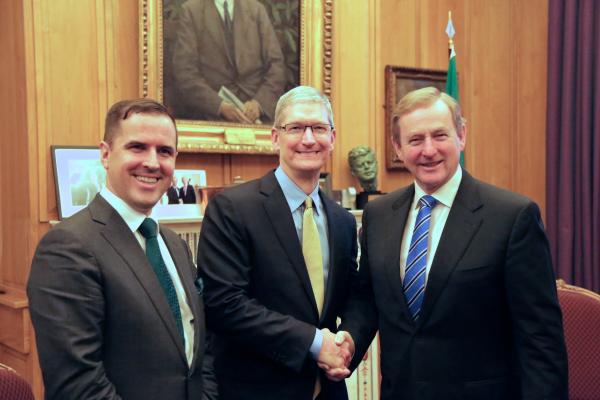Apple’s Tax Stance Betrays Its Sense Of Social Importance

ANALYSIS: Apple CEO Tim Cook appears to have ignored the EC’s legal argument, but even still, shouldn’t Apple be paying more than 0.005 percent on its European profits?
Times are strange when a national government is actively trying to avoid collecting £11 billion in unpaid taxes, but that’s exactly what the Irish government hopes to achieve.
The European Commission’s (EC) ruling that the especially low tax rates granted by Dublin to Apple, and only Apple, are tantamount to state aid as no other company has been gifted the same rate. And by routing all of its European income through two subsidiaries in the country, Apple has paid virtually nothing on all of its profits within the EU single market.
Apple has a long history in Ireland (well, long in technology terms), having opened its first office in Europe in County Cork in 1980. And boy, it wants you to know it.
Apple tax
 An open letter penned by Tim Cook to Europe describes how Apple has remained in Holyhill through “periods of uncertainty about our own business” and provided jobs when Cork was suffering from high unemployment and extremely low economic investment.
An open letter penned by Tim Cook to Europe describes how Apple has remained in Holyhill through “periods of uncertainty about our own business” and provided jobs when Cork was suffering from high unemployment and extremely low economic investment.
Indeed, before the EC’s ruling, Apple planned to expand its Irish workforce by 1,000 to 6,000 staff. This obviously makes it a major employer in Ireland, which has enthusiastically courted technology firms to boost its economy.
But such moves are easier when a company has a corporate tax rate of just 0.005 percent – a generosity that Ireland does not afford Apple’s competitors. And it’s especially easy when the majority of revenue across Europe is re-routed through offices based in territories where this rate applies.
EC argument
“Over the years, we received guidance from Irish tax authorities on how to comply correctly with Irish tax law — the same kind of guidance available to any company doing business there,” said Cook. “In Ireland and in every country where we operate, Apple follows the law and we pay all the taxes we owe.
“The Commission’s move is unprecedented and it has serious, wide-reaching implications. It is effectively proposing to replace Irish tax laws with a view of what the Commission thinks the law should have been. This would strike a devastating blow to the sovereignty of EU member states over their own tax matters, and to the principle of certainty of law in Europe.”
If the EC was arguing what rates of tax can and can’t be offered by individual member states then Cook would be right, but this is not what the Commission is saying. It is saying Ireland cannot offer a rate of 0.005 percent to one company and 12.5 percent (the usual rate of Irish corporation tax) to another – an argument Cook has chosen to ignore in his lengthy response.
“Member States cannot give tax benefits to selected companies – this is illegal under EU state aid rules,” confirmed Commissioner Margrethe Vestager, who is in charge of competition policy.
More than a tech company?
 Like all major companies and wealthy individuals, Apple works to minimise its tax bill and its defence is that it pays all the tax it ‘legally’ owes. But Apple has always considered itself to be more than a technology company, claiming it changes lives with its products, and using its platform to take commendable stances on social issues. It has recently started trying to improve its green image and now it is talking up its role in Ireland and Europe.
Like all major companies and wealthy individuals, Apple works to minimise its tax bill and its defence is that it pays all the tax it ‘legally’ owes. But Apple has always considered itself to be more than a technology company, claiming it changes lives with its products, and using its platform to take commendable stances on social issues. It has recently started trying to improve its green image and now it is talking up its role in Ireland and Europe.
Both the company and the Irish authorities will appeal and it will be surprising if the full €13 billion quoted by the commission is ever collected. Not least because the government there is so keen on attracting businesses from the UK spooked by Brexit and because Apple has suggested future investments in Cork could be threatened – potentially damaging the local economy.
“The European Commission has launched an effort to rewrite Apple’s history in Europe, ignore Ireland’s tax laws and upend the international tax system in the process,” alleges Cook, arguing it has done everything by the book.
The outcome of this saga could take months or even years to become apparent but it must be asked that regardless of how legal its actions have been, should a company that has such a high opinion of itself and such a professed commitment to Europe be doing Irish and European citizens a greater justice by paying more than 0.005 percent tax?
How well do you know Apple? Take our quiz.